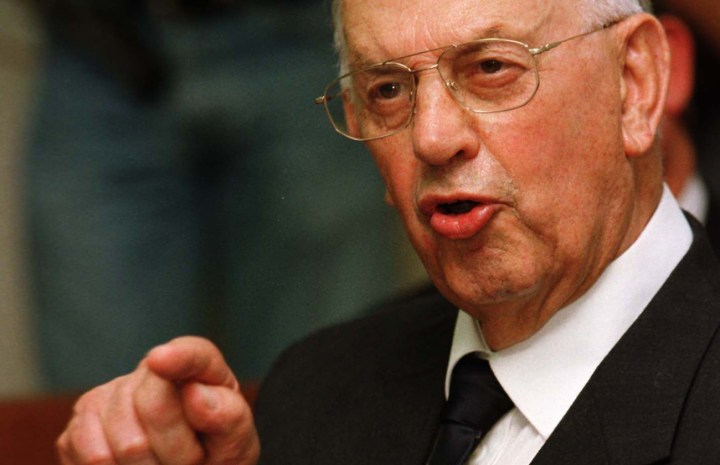Politics, South Africa
The last 25 years: From a wagging finger to a show of hands

It’s been a quarter of a century since South Africa’s last whites-only general election. CHRIS GIBBONS examines what’s changed and what hasn’t.
It is 6 May 1987 – the last time South Africa’s white population voted in a racially exclusive parliamentary general election. Die Groot Krokodil was still wagging a presidential finger and rolling his angry bottom lip. It would be his last election, too, suffering a stroke 18 months later to make way for FW de Klerk. But in the autumn of ’87, PW Botha, flanked by Magnus Malan, was still very much the big man of the National Party.
Across the political stage, but also wagging a mean finger, Dr Andries Treurnicht and the Conservative Party, were exhorting voters to “Restore SA’s Greatness – Vote CP”. Beyond them, on the bleeding edge of the right wing, was Jaap Marais’s Herstigte Nasionale Party – “Bly Blank My Volk” – “Stay White My People.” This was an election not about change, but about whether PW could hold the centre and prevent ever-angrier chunks of his National Party from splintering off and threatening civil war.
Writing four days after the poll in the Los Angeles Times, Michael Parks assessed it like this: “The dramatic victory of President Pieter W Botha’s National Party in last week’s whites-only parliamentary election has drawn the lines of conflict more sharply than ever in South Africa… After years of trying to finesse the contradiction between black demands for majority rule and the white minority’s unwillingness to yield real power, South Africa now appears to be moving toward direct political, and probably armed, conflict on an even broader scale than before to resolve the issue.”
Whether then secretary-general of the recently formed Cosatu Jay Naidoo would have agreed with Parks’ use of the word “finesse” is a moot point. The morning after the election, Cosatu House in central Johannesburg was rocked by two massive bomb blasts, a direct response by PW’s security establishment to the 2.5-million worker stayaway that Naidoo and his colleagues in the UDF had just organised. Across the country, activists were killed, beaten, imprisoned, tortured, as we later discovered at the Truth and Reconciliation Commission.
These were difficult, violent times. The media were tightly controlled. SA Associated Newspapers still carried a weight of opprobrium following its decision to shut the Rand Daily Mail, South Africa’s most consistently liberal and anti-government voice. SAAN denied it had been leaned on by government, but when they were awarded a 25% chunk of newly established satellite broadcaster M-Net it was seen as a payoff. The country’s only independent radio station, Johannesburg’s Radio 702, had just made the bold decision to switch from music to talk radio. Phones were tapped, newsrooms infested with security police spies, intimidation and detention were common occurrences.
In May 1987, South Africa’s economy was shattered, with growth among the lowest in the world. The rand had collapsed, from two to the US dollar to four. Fortress South Africa had become an angry, burning encampment, cut off from the rest of the world, hemmed in by barbed wire of its own making. Even old sporting friends had abandoned us. Isolation was complete.
It does well to think back and remember those times very clearly: it’s human nature to wipe out the bad times and only remember the good, especially when confronting contemporary problems.
In the intervening 25 years since the last whites-only election an enormous amount has changed here and much of it for the good. Sporting isolation is history, the economy, though sluggish, is growing faster than our American and European counterparts’. An estimated 16 million people now have some form of social grant and for many the healthcare system is vastly improved. There are now dozens of commercial and community radio stations, several new newspapers and this thing called the internet. Heads of state come and go, and our politicians travel where they will, as can most of our citizens.
Which brings us to the things that haven’t changed at all. Political activity is open and free, though there seems to be as much skulduggery and behind-the-scenes manoeuvring as ever. The SABC remains as it was in 1987 – a political tool in the hands of the ruling party. There is also growing concern at the levels of police involvement in politics – or, to rephrase that, the increasing use of the police and other elements of the state’s security apparatus by politicians for their own ends. Messrs Botha and Malan would have felt immediately at home reading this week’s headlines about General Richard Mdluli and the road to Mangaung. In addition, common-or-garden police brutality – another of this week’s headlines – was something the Nats had raised to a fine art.
They would also have known they were back in Pretoria by examining the headlines about the e-tolling debacle, along with suggestions of impropriety along the lines of the arms deal. These were the men, after all, who first raided the fuel levy funds to pay for clandestine operations against the ANC. It was said at the time that you couldn’t be a successful Nat politician unless you had a numbered Swiss bank account, and a bolt-hole in Paraguay.
What might have caused them to raise an eyebrow is the rampantly public nature of the corruption which bedevils government, and the open discord in the ANC. Of course the Nats were corrupt, but they were discreet and did not allow corruption to interfere with a ruthlessly efficient government machine, if we can ignore for a moment the hapless targets of that efficiency. Nor did political infighting spill into public places: you did as you were told by PW, or, like AP Treurnicht, you left the party and played by yourself.
It has become trite to draw parallels between the Nats then and the ANC now but, despite some tempting similarities, it is fundamentally wrong. The South Africa of May 1987 was dark, oppressive, dangerous, deadly, dispiriting. Twenty-five years later, of course we have problems – which country doesn’t? – but in that quarter-century span we have become a very new and different nation. I, for one, look forward to the next 25. DM
Photo: The Groot Krokodil – PW Botha.





 Become an Insider
Become an Insider